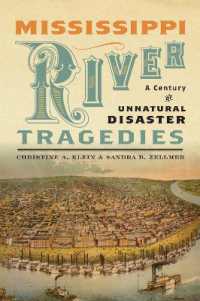- ホーム
- > 洋書
- > 英文書
- > Cinema / Film
Full Description
This book examines the interactions between ghosts and families in three recent horror films from the Spanish-speaking world that, rather than explicitly referencing recent political violence, speak to the societal conditions and everyday normative violence that serve as preconditions for political violence. This study deconstructs intersectional processes of racially and sexually normative subject formation—and its oppositional other, ghostly erasure—that are framed by a common temporal logic, wherein full citizenship is contingent upon a nation's dominant notions of contemporaneousness and whether individuals properly inhabit prescriptive timelines of (re)productivity.
St-Georges's study explores ways in which ghosts and families are manipulated in each national imaginary as a strategy for negotiating volatility within symbolic order: a tactic that can either naturalize or challenge normative discourses. As a literary and cinematic trope, ghosts are particularly useful vehicles for the exploration of national imaginaries and the dominant or competing cultural attitudes towards a country's history, and thus, the articulation of a present political reality. The rhetorical figure of the family is also key in this process as a mechanism for expressing national allegories, for expressing generational anxieties about a nation's relationship to time, and for organizing societies and social subjects as such, interpellating them into or excluding them from national imaginaries. By proposing these specific coordinates—ghosts and families—and by mapping their relationship between Spain and Latin America, Troubling Timelines proposes a study of a temporal framework that, besides bridging the traditional area-studies divide across the Atlantic, creates a space for interdisciplinary inquiry while also responding to increasing demand for studies that focus on intersectionality.
Contents
Chapter 1 - Temporal Coordinates, Erasures, and Hauntings
Chapter 2 - The Modernized Myth and Mythical Modernity in Mexico
Chapter 3 - Ticking Biological Clocks and the Fluid Feminine in Kilómetro31
Chapter 4 - Orphans as Reflections on the Traumatic Past and Interrogations into Social Order in El Orfanato
Chapter 5 - Families That Matter: Ghosts, (Dis)Possessions, and the Logic of (Re)Productivity in Los Inocentes






